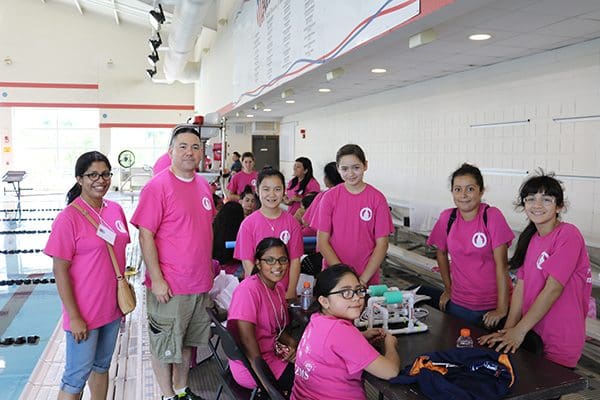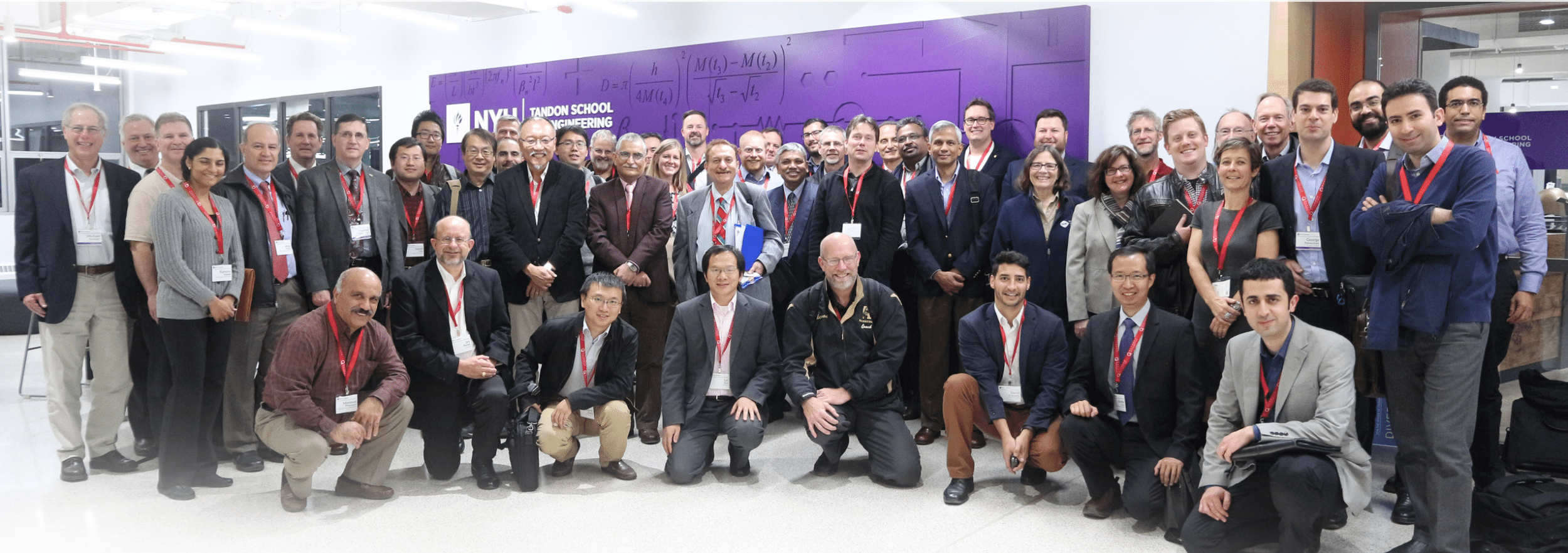
The work of Dr. Michael Frye truly embodies the phrase “advanced engineering”. Throughout his career, he has worked on some of the most sophisticated, complex, and ambitious engineering systems in any modern field. His specialization is in unmanned aerial vehicles (UAVs) — drones. His work has taken him through industry leaders such as Lockheed Martin and AT&T. But today, he is a teacher, in the truest sense of the word.
He is an Associate Professor of Engineering at the University of the Incarnate Word (UIW) in San Antonio, Texas where he co-directs the Autonomous Vehicle Systems (AVS) Laboratory, along with Dr. Sreerenjini Nair, Assistant Professor of Physics. From the AVS Lab, he has built a significant research portfolio in autonomous vehicle control. He has been the past recipient of significant grants from various agencies including the Department of Defense. But these days, he is turning his ingenuity away from cutting edge research to our underserved communities.
The struggle to excite children to the potential and importance of STEM fields is all too familiar. We have accordingly responded with countless programs introducing robotics, coding, maker projects, and other contemporary technologies to introduce our kids to the fun of engineering. As good as these programs are, the fundamental question of “is fun enough?” remains unanswered. Colleges STEM programs still struggle to be seen as a preferred destination for the broader youth population.
Two years ago, Frye and Nair connected with Quanser, wellknown for its work in technology platforms for teaching and research in control, mechatronics, and robotics. Initially, the context was principally the research application of Quanser’s unmanned aerial and ground vehicles (QBall and QBot). This conversation led to a significant increase in the research capacity of the AVS Lab by using Quanser’s Unmanned Vehicle Systems (UVS) research platform. Indeed the AVS Lab, upon completion of the next research expansion phase, will be one of the largest academic labs of its type in the world. However, the discussion very quickly detoured to a talk about the community outreach programs that both Frye and Nair host through the AVS Lab. An interesting question that was brought up was, “How can highly sophisticated engineering systems offer a more motivating and more meaningful introduction to engineering and STEM?”
Conceptually the collaboration with Quanser was a perfect match. Technically, Quanser drones, unlike commercially available vehicles are designed specifically for academic use with the controllability and safety that would be essential for operation by a broad range of users – e.g. students. The software interfaces also allow students to peer inside the brain of the modern smart drone and experience the true impact of this technology. The potential of cyberphysical systems or Internet of Things in challenging civilian applications are much easier to show when students can actually see and play with the inner smarts.
As a relatively small, principally undergraduate institution, some of the most active users of these advanced systems were undergrads and the extension of the application from pure research to education typically occurs naturally. UIW senior Tomás Goldaracena, in a recent profile published by UIW, explains “We will be the largest autonomous vehicle lab in the country. We will be bigger than MIT or CalTech when it comes to our equipment”. Universities have historically maintained clear boundaries between core undergraduate programs and the research lab but Frye and Nair are among the growing number of institutions choosing to blur this line to provide students with a much richer and appropriately intense learning experience.
But can this be pushed even further? Further down? This is the next question for Frye and Nair. Can they take the same high-impact introduction to advanced engineering to high school and even middle school? One immediate outreach application of the UVS lab was the UIW STEM Summer Camp for high school students where the Lab was used for an introduction to robotics. But a more ambitious and potentially more critical outreach direction is within the AVS Lab’s miniGEMS STEM program – GEMS stands for Girls in Engineering Math and Science.
miniGEMS is a free five-day STEM Summer camp organized and run by the AVS Lab for approximately 26 middle school girls. In Summer 2015 and 2016 the camp was planned, coordinated, and directed by the Frye and Nair. The primary goal of the camp is to introduce more females to the field of Engineering through robotic projects and competitions, guest speakers, and site visits. The students also had the opportunity to build and compete using the SeaPerch underwater robots, provided by a grant from the Office of Naval Research. Parents are provided opportunities to learn about STEM fields and how to apply to help their daughters apply for college. Two miniGEMS middle school student camps will be hosted Summer 2017.
miniGEMS targets underrepresented middle school students and provides an opportunity for students to attend a STEM camp without having to meet an arbitrary grade requirement, pay an application fee, have transportation, or even an interest in STEM fields. All miniGEMS students are provided transportation from their middle school by a UIW shuttle, all meals are provided, and the students can compete for prizes from visiting engineering companies. The miniGEMS camp offers middle school girls with a chance to do advanced engineering in a way that thematically makes sense and is engaging. Robotic projects, guest speakers, field trips, and direct access to the UVS Lab form the core of the program. Girls engage with not just the technology of advanced engineering but the people and community of advanced engineering.
What is next? Frye and Nair’s vision now encompasses a fundamentally important constituency in this context but one that is often not well-addressed most outreach programs. They are currently developing a strategy and have begun seeking support and funding to empower the teachers of the earlier grades to more confidently talk about engineering to their students. Teachers remain a critical source of guidance for children and this new initiative, through a rich immersion in advanced engineering via the AVS Lab. What is engineering and why is it so important and beneficial to society are the questions that Frye and Nair hope to answer more completely than ever before.
The notion of putting very expensive research equipment in the hands of middle school students and their teachers would have been heresy two decades ago. But is this really true? Robots of any sort and indeed digital computers were the stuff of the most exclusive research labs when they first appeared on the engineering scene but now they are basically furniture. So advanced technology filtering down the educational sequence is a natural behavior among engineering faculty. What makes the work of Frye and Nair unique is the purposeful, conscious, and conscientious driving of the advanced technologies and methodologies down the sequence to ensure a quicker and more profound impact is the real difference. Sometimes our best researchers are our best teachers.
References
UIW AVS Lab:
http://www.uiw.edu/smse/documents/smse_newsletter_fa2014_web.pdf
UIW student profile Tomaś Goldaracena:
http://www.uiw.edu/heartofuiw/tomas-goldaracena.html
Quanser unmanned vehicle research platform:
https://www.quanser.com/products/qball2 and https://www.quanser.com/Products/qbot2
About
Dr. Tom Lee has been an active contributor in the global engineering and control systems community for over twenty years. As Chief Business Development Officer at Quanser, a leader in real-time control and mechatronics solutions for education, research, and industry,Dr. Lee develops and implements the company’s strategy for enriching and increasing the educational effectiveness of technology in the modern engineering education context. Prior to his appointment at Quanser, Dr. Lee was Vice President of Applications Engineering at Maplesoft, creators of the renowned Maple mathematical software system. In that capacity, he helped the company transform the mathematical technology to a complete engineering modeling and simulation solution. He also serves as an Adjunct Professor of Systems Design Engineering at the University of Waterloo, noted for its leadership in engineering, computer science, and mathematics. Dr. Lee earned his Ph.D. in Mechanical Engineering at the University of Waterloo, and his M.A.Sc. and B.A.Sc. in Systems Design Engineering at the University of Waterloo. He has published numerous papers and is a frequent invited speaker in the areas of engineering education, engineering modeling and simulation, and engineering computation.



